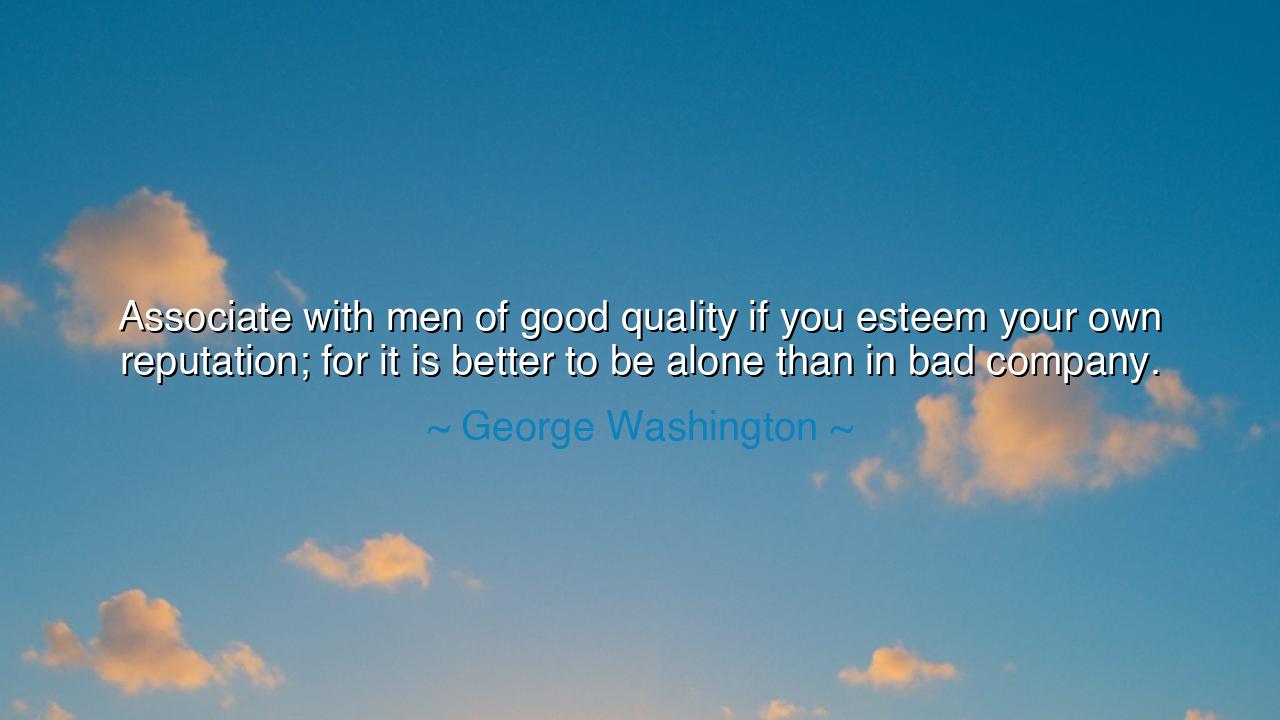
Associate with men of good quality if you esteem your own
Associate with men of good quality if you esteem your own reputation; for it is better to be alone than in bad company.






“Associate with men of good quality if you esteem your own reputation; for it is better to be alone than in bad company.”
Thus spoke George Washington, the first leader of a free America, a man whose words were measured not only by wisdom but by the weight of character. In this counsel, he gives voice to one of the oldest truths known to humankind: that the company we keep shapes the person we become. To associate with men of good quality is not merely to seek friendship with the noble and wise — it is to guard the soul from corruption, to choose the light over the shadow. And to be alone rather than in bad company is the mark of inner strength, for the one who can walk in solitude rather than compromise virtue has already mastered himself.
Washington, a man of both action and restraint, understood this deeply. Before he was a president, he was a soldier and a commander, tested not only by war but by temptation — the lure of ambition, the flattery of false allies, the corruption of power. Through his long life, he observed that the downfall of great men often began not with an enemy’s sword, but with the whisper of bad companions. Thus, he warned that one’s reputation — the reflection of one’s character in the eyes of the world — depends not only on one’s deeds, but on one’s circle. For those who walk among the dishonest will be judged by their company, even if their own heart remains pure.
The origin of this wisdom reaches far beyond Washington’s age, for it is a principle sung by sages of every civilization. The philosopher Confucius taught, “Do not befriend anyone who is not better than you,” while the Greek historian Thucydides observed that a city’s greatness lies in the virtue of its citizens. The ancients knew that morality spreads like flame or rot — that virtue lifts those who dwell near it, and vice drags all who linger too long in its grasp. Washington, steeped in both classical thought and the hard lessons of leadership, inherited this truth and wove it into the moral fabric of his young nation.
Consider the story of Marcus Aurelius, the philosopher-emperor of Rome. Surrounded by generals, courtiers, and flatterers, he guarded his soul fiercely against the poison of bad counsel. In his private writings, he reminded himself to “avoid the trifling talk of men unworthy of your attention.” Though he ruled the mightiest empire of his time, he preferred the solitude of virtue to the comfort of corrupt company. Like Washington centuries later, he knew that the quality of one’s companions shapes not only one’s destiny, but one’s peace of mind.
To esteem your own reputation is not an act of vanity, but of self-respect. The wise know that reputation is not the false mask of pride, but the mirror of integrity. It is the silent voice that speaks of who we are when we are not present to defend ourselves. And because others cannot see our thoughts, they judge our character by our companions. Thus, when Washington warns against “bad company,” he is not speaking only of thieves or liars, but of all who live without honor — the idle, the bitter, the deceitful, the small-minded. Their presence dulls the edge of the soul and stains the spirit by degrees.
To be alone, on the other hand, is not a curse but a choice of purity. Solitude can be a sanctuary where the mind strengthens and the heart regains clarity. The coward seeks company to avoid himself, but the strong man walks alone when truth demands it. Many of history’s greatest lights — prophets, poets, inventors, and leaders — found their wisdom not in crowds but in quiet. Washington himself often withdrew to his Mount Vernon estate to reflect and renew his purpose, knowing that solitude, when filled with thought and principle, is more honorable than the noisiest companionship.
The lesson of Washington’s words is timeless: choose your companions as carefully as you would choose your destiny. Seek those who uplift your mind, who challenge your spirit to rise higher, who remind you to live with honor. When faced with company that corrupts, have the courage to walk alone rather than lose yourself among the unworthy. For the measure of a person is not in how many stand beside them, but in the virtue of those who do.
So, my child of the future, remember: reputation is a garden — it blooms or decays according to what you plant around it. Keep company with the noble, even if they are few, and cherish solitude when virtue demands it. For it is far better to stand alone in righteousness than to sit comfortably among those who have forsaken it. In this, Washington’s voice speaks through the centuries — a reminder that greatness begins not with power, but with the purity of one’s companions and the courage to walk the path of truth, even when it leads through silence.






AAdministratorAdministrator
Welcome, honored guests. Please leave a comment, we will respond soon